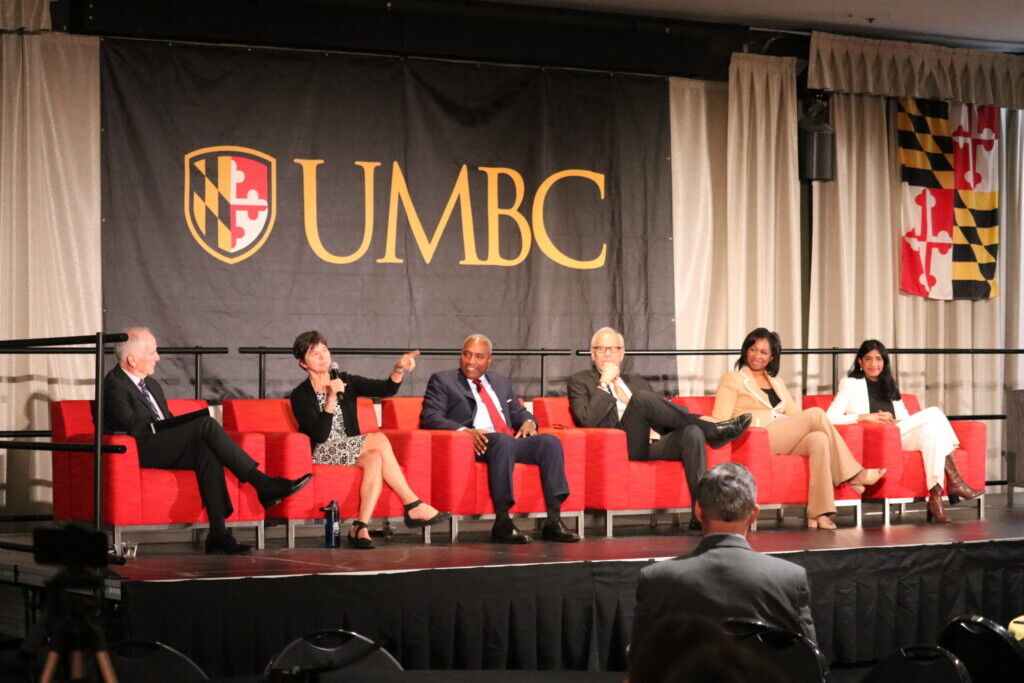
This article was republished with permission from WTOP’s news partners at Maryland Matters. Sign up for Maryland Matters’ free email subscription today.
This content was republished with permission from WTOP’s news partners at Maryland Matters. Sign up for Maryland Matters’ free email subscription today.
Lt. Gov. Aruna Miller (D) and other top state officials gathered at the University of Maryland Baltimore County on Wednesday to discuss how state government plans to encourage clean energy and reduce the effects of climate change, during a forum that included community members and students from the university.
The overarching message from the state officials: the challenge of reducing the effects of climate change will take wide-reaching efforts from every arm of the government, from transportation to land planning, in addition to local efforts.
“It’s going to take government — federal, state and local entities — it’s going to take private industry…nonprofits, community activists, as well as individuals. Everyone has a role in addressing climate change,” Miller said.
The Wednesday forum took place as a collaboration between Maryland Matters and the University of Maryland Baltimore County. The evening conversation was moderated by Josh Kurtz, founding editor and reporter at Maryland Matters, and Candace Dodson-Reed, UMBC’s vice president for government relations and community affairs.
The six-person panel included the lieutenant governor, Secretary of Commerce Kevin Anderson, Secretary of Planning Rebecca Flora, Secretary of the Environment Serena McIlwain, Secretary of Transportation Paul Wiedefeld and director of Maryland Energy Administration, Paul Pinsky.
The leaders of each agency agreed that climate change is an existential threat to Marylanders and needs a multi-faceted approach to address the issue.
Maryland Matters previously reported that Gov. Wes Moore (D) has signaled that he sees several departments as integral parts of combating climate change and promoting clean energy, including the Departments of Transportation, Planning and Commerce.
Questions arose about the cost and implementation of various climate policies, and while Miller said the administration does not have a grand total, she emphasized that the cost to not address climate change would be more severe.
“I can tell you — if we don’t do anything that the cost is going to be so impactive, right? To our health, to the health of individuals, to the health of our climate as well… What that exact number is, I don’t know that right now, because it is so vast,” she said, responding to questions from the moderators.
She continued: “It’s such a huge vast undertaking to address climate change, but again working with others to help us get to that place — whether it’s through clean energy, offshore wind, hydroelectric, solar, all of these methodologies that we can use. In the end, it’s going to cost, but it’s going to create a whole new ecosystem of companies that are out there. Create jobs, create new emerging technologies.”
During questions from the audience, Donald Boesch, professor of marine science at the University of Maryland Center for Environmental Science, asked state officials how they plan to get reluctant Marylanders on board with climate policy changes that might affect their own lives.
Secretary of the Environment Serena McIlwain responded:
“It’s all hands on deck. …We’re putting out a lot information, a lot of marketing, a lot of news…really pushing out to the public why we’re doing it, why it’s important, and why we need you to help.
“For example, when we push the automotive industry to zero emission vehicles, that’s pushing citizens to respond. We can’t make you buy one, but eventually your choices will be limited,” she continued.
Secretary of Planning Rebecca Flora said that in order to ensure that the goals of the Moore-Miller administration are long-lasting, climate-focused policies will need to be a part of new future development plans.
“We have to hardwire it in. The best way to do that is to not allow any new buildings, or any new infrastructure to be built, unless they’re meeting these requirements. That hardwires it, because those things are around for a very, very, very long time.”
She continued: “So that we design, build, plan that in the right way so that it’s lasting and meets all these goals and helps us with that solution.”
The full forum can be viewed here.







